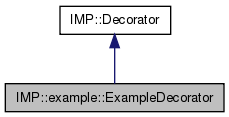A decorator adds functionality to a particle and ensures that invariants are preserved. In this case, the functionality is the setting and access of a name for the Particle and the invariant is that the name is always non-empty.
The source code is as follows:
/** * \file example/ExampleDecorator.h \brief Add a name to a particle. * * Copyright 2007-2010 IMP Inventors. All rights reserved. * */ #ifndef IMPEXAMPLE_EXAMPLE_DECORATOR_H #define IMPEXAMPLE_EXAMPLE_DECORATOR_H #include "example_config.h" #include <IMP/core/core_macros.h> #include <IMP/Particle.h> #include <IMP/Model.h> #include <IMP/Decorator.h> #include <IMP/exception.h> IMPEXAMPLE_BEGIN_NAMESPACE //! A simple decorator which adds a name to a particle. /** A decorator adds functionality to a particle and ensures that invariants are preserved. In this case, the functionality is the setting and access of a name for the Particle and the invariant is that the name is always non-empty. The source code is as follows: \include ExampleDecorator.h \include ExampleDecorator.cpp */ class IMPEXAMPLEEXPORT ExampleDecorator: public Decorator { /* Use a static variable in a static method to create the key so that it is only done once and is only done when it is first needed. Lazy initialization of keys makes \imp more efficient as Particles do not have to allocate memory for ununsed keys. */ static StringKey get_name_key(); public: //! Add a name to the particle /** The create function should take arguments which allow the initial state of the Decorator to be reasonable (i.e. make sure there is a non-empty name). */ static ExampleDecorator setup_particle(Particle *p, std::string name) { IMP_USAGE_CHECK(!name.empty(), "The name cannot be empty."); p->add_attribute(get_name_key(), name); ExampleDecorator ret(p); return ret; } //! return true if the particle has a name static bool particle_is_instance(Particle *p) { return p->has_attribute(get_name_key()); } //! Set the name of the particle void set_name(std::string name) { IMP_USAGE_CHECK(!name.empty(), "The name cannot be empty."); get_particle()->set_value(get_name_key(), name); } //! Get the name of the particle std::string get_name() const { return get_particle()->get_value(get_name_key()); } /* Declare the basic constructors and the cast function.*/ IMP_DECORATOR(ExampleDecorator, Decorator); }; // Make it so the C++ operator<< can be used. IMP_OUTPUT_OPERATOR(ExampleDecorator); /** Define a collection of them. Also look at example.i*/ typedef Decorators<ExampleDecorator, Particles> ExampleDecorators; IMPEXAMPLE_END_NAMESPACE #endif /* IMPEXAMPLE_EXAMPLE_DECORATOR_H */
/** * \file example/ExampleDecorator.cpp * \brief Add a name to a particle. * * Copyright 2007-2010 IMP Inventors. All rights reserved. * */ #include <IMP/example/ExampleDecorator.h> IMPEXAMPLE_BEGIN_NAMESPACE StringKey ExampleDecorator::get_name_key() { /* the compiler will make sure this is initialized the first time the method is called. */ static StringKey mykey("my name"); return mykey; } void ExampleDecorator::show(std::ostream &out) const { out << get_name(); } IMPEXAMPLE_END_NAMESPACE

Public Member Functions | |
| ExampleDecorator (::IMP::Particle *p) | |
| std::string | get_name () const |
| Get the name of the particle. | |
| void | set_name (std::string name) |
| Set the name of the particle. | |
Static Public Member Functions | |
| static ExampleDecorator | decorate_particle (::IMP::Particle *p) |
| static bool | particle_is_instance (Particle *p) |
| return true if the particle has a name | |
| static ExampleDecorator | setup_particle (Particle *p, std::string name) |
| Add a name to the particle. | |
| static ExampleDecorator IMP::example::ExampleDecorator::setup_particle | ( | Particle * | p, | |
| std::string | name | |||
| ) | [static] |
Add a name to the particle.
The create function should take arguments which allow the initial state of the Decorator to be reasonable (i.e. make sure there is a non-empty name).